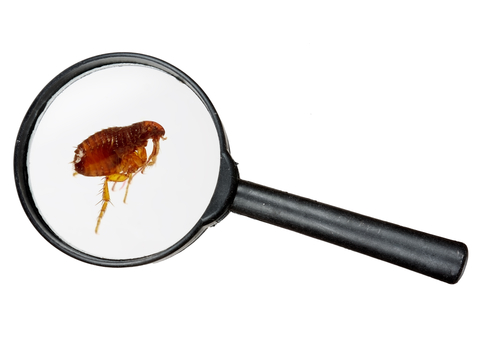While cats are a bit more likely than dogs to have fleas, it’s still a very common problem for dogs across the entire US. The largest concentration of flea infestations is in the Southern US, however, there’s virtually no part of the country that isn’t affected by fleas.
There are many variables as to why flea infestations are more likely to occur in certain geographic regions; weather, seasonal changes, the prevalence of anti-flea treatments, etc. The important thing to keep in mind is that there are numerous risks associated with fleas (especially for dogs).
Whether you’re here to learn more about fleas, or you want to find out what some of the best anti-flea medications are, below we cover everything you’d ever want to know about fleas in dogs. Symptoms, details about flea life cycles, and how to prevent fleas from infecting your dog in the first place.
Taking a Closer Look at Fleas
Fleas are a type of parasite, which are living organisms that feed off of other animals (i.e. their “hosts”). There are both internal and external parasites. An example of an internal parasite would be heartworms, whereas fleas are a classic example of external parasites.
Unfortunately, fleas can survive through most types of weather, but they thrive during warm weather (which is one of the reasons why they’re so prevalent in the Southern US). While there are other types of external parasites that can infect dogs, fleas are 100% the most common (throughout the world).
Inside the Life Cycle of Fleas
Parasites, just like any other living organism, are born into this world (and then develop into their mature versions via several stages of development). Most cycles take anywhere from two weeks, all the way to several months, to complete.
Fleas begin their lives as eggs, which then turn into what’s known as “larva.” From there, they mature again into what’s called “pupa” (kind of like an adolescent flea), and then finally into an adult. After a flea turns into an adult, they mate with each other and then lay more eggs (on the host – further continuing the cycle). Below is a simple list of the three main stages of a flea’s life:
- Egg (when it hatches from its egg)
- The period from when it hatches to when it becomes a pupa
- The period from when it turns from a pupa to a fully matured flea
This is one of the main reasons why many anti-flea medications serve to both kill existing parasites, as well as kill their eggs. Medications like Sentinel for dogs kills flea eggs (so that the infestation can be stopped in its tracks).
If you only use one type of medication (that only kills either the eggs or the adults), the infestation won’t be completely stopped (because either the adults will keep mating and laying eggs, or the eggs will continue to hatch). This is why most vets choose to prescribe a medication that targets both adults and their eggs/offspring.

How to Prevent Fleas in Your Dog
There are several areas to focus on when it comes to flea prevention. Namely, you need to realize that fleas can be picked up from both inside (i.e. your house) as well as outdoors.
When it comes to preventing the development of fleas inside your home (or wherever your dog actually “lives”), the best thing to do is stay on top of cleaning. Bedding, carpets, floors, etc. should all be cleaned as regularly as possible (otherwise you run the risk of developing fleas within these areas).
In terms of preventing your dog from getting fleas when they’re outside, there’s not as much direct action you can take (compared to internal environments). However, many owners (who have suffered through their dog’s flea infestation) have used pesticides to spray certain outdoor areas where they know fleas might be developing/breeding. This is only one option (and should be carefully considered – because pesticides can be dangerous to your pet and yourself).
Treatments
There are also many different anti-flea treatments available, most of which are prescription-based (so you’ll need to schedule a visit with your vet first). Most of these products work to completely kill both flea eggs and mature fleas.
There are also several home-based remedies, however many of these have questionable results (in terms of actually killing fleas, although they might work in preventing fleas from latching onto your dog). Whatever option you’re considering, it’s recommended to consult with your vet before making any decisions.
